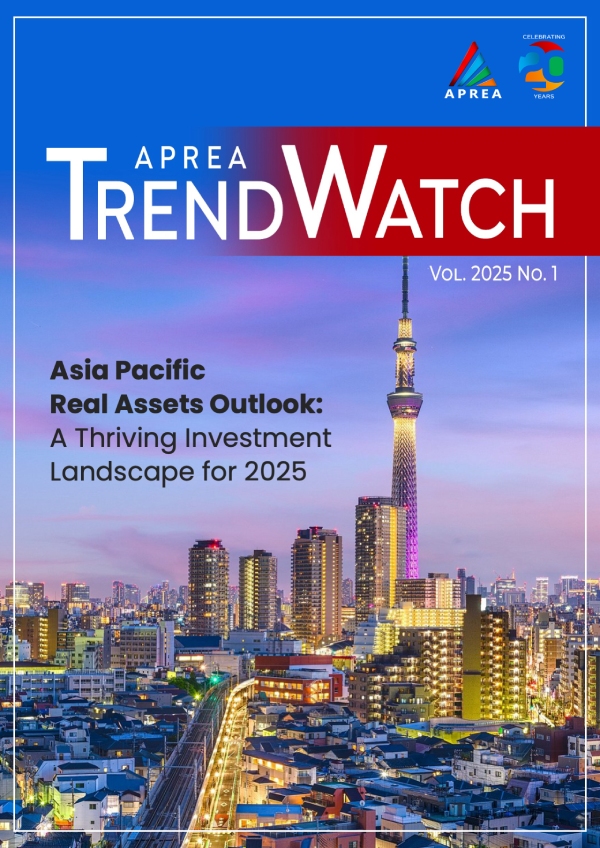The Asia Pacific commercial real estate market will see a modest improvement this year on the back of a resilient regional economy and the downward interest rate cycle. However, the outlook by market and sector will vary, often significantly, leading us to adopt “Steady Growth, Split Performance: Navigating a Multispeed Recovery” as the central theme of our 2025 Asia Pacific Real Estate Market Outlook.
Economy: Asia Pacific GDP growth is forecasted to reach 4.1% in 2025. Although U.S. tariffs could weigh on regional growth, the precise implementation and impact of any new tariff regime remains uncertain. Policy rates across many Asia Pacific economies are forecasted to fall at relatively modest magnitudes, except for Japan, which is expected to implement further interest rate hikes this year.
Capital Markets: CBRE forecasts commercial real estate transaction volume to rise 5-10% y-o-y in 2025, driven by growth in Singapore, Korea, Australia and Hong Kong SAR, and continued investor interest in Japan and India. With individual Asia Pacific markets at different stages of the pricing cycle, yield movement will diverge across markets.
Office: Leasing activity and rents are expected to register modest growth, with flight to quality demand remaining prominent. This will drive additional requirements for high-quality office space in prime core locations, with properties in non-core areas set to become even less attractive.
Industrial & Logistics: Expansionary sentiment among logistics occupiers will gradually pick up this year, backed by a mild increase in requirements from manufacturers and e-commerce platforms. However, most occupiers will retain a cautious approach towards real estate portfolio planning amid high rental growth.
Retail: Consumer sentiment is expected to improve in 2025 amid the solid employment market, leading to stronger retail sales growth. Regional retail rents will continue their slow but steady recovery as retailers retain a cautiously optimistic attitude towards real estate planning.
Hotels: The outlook for the hotel sector is positive, with international tourism projected to complete its recovery in 2025. CBRE expects modest RevPAR growth in 2025, driven by further hotel occupancy gains as daily rates continue to moderate.
Download the Report Read MoreThe Asia-Pacific Horizon report examines the present economic and geopolitical landscape, evaluates the challenges and opportunities within the Residential and Commercial sectors, and provides guidance on unlocking potential.
Download the Report Read MoreThe Asia Pacific real assets market is set for a vibrant 2025, offering diverse investment opportunities across established cities such as Tokyo and Sydney, as well as emerging markets including India and Vietnam. Key drivers include economic expansion, infrastructure development, and shifts in global supply chains, leading to growing demand for sectors such as industrial logistics, multifamily housing, and data centers. These opportunities are further enhanced by urbanization, rising income levels, and the integration of technology and sustainability in real estate strategies. Despite challenges such as geopolitical risks and rising costs, the Asia Pacific remains a top choice for global investors seeking a balance of growth and stability.

CBRE’s 2025 Asia Pacific Investor Intentions Survey uncovered an improvement in buying intentions across most markets in Asia Pacific this year, with over half of respondents indicating their preference to buy more real estate in 2025. With the interest rate cut cycle underway in most markets, investors are gearing up for an increase in activity over the next 12 months, albeit with individual Asia Pacific markets staggered at different stages of the pricing and investment cycles.
Although real estate investment activity in most markets is forecasted to increase through 2025, the extent at which it will do so will differ according to location. While markets including Australia, Korea, Singapore, and Hong Kong SAR are expected to see gains in transaction activity in 2025, investors are less optimistic about the extent of rate cuts in 2025, which could weigh on investment sentiment throughout the year. After a strong 2024, Japan and India are expected to witness robust purchasing activity in 2025, with core/core-plus investment strategies in the former and opportunistic strategies in the latter most prevalent.
The survey was conducted in November and December 2024. Over 460 responses were received from participants who were asked a range of questions related to their buying intentions, perceived challenges and preferred investment strategies, sectors, and markets for the coming year.
Other key findings:
View the Report Read More
The real estate sector in the Asia Pacific (APAC) region continues to demonstrate robust growth with significant advancements in the housing segment, financing schemes and sustainable transformation. Technological progress in APAC economies has also catalysed transformation within the real estate sector, with technologies such as 3D printing and online home building tools gaining momentum. These changes have concurrently influenced the development of real estate projects within the region.
The APAC real estate sector is progressively adopting green energy innovations mainly through partnerships and investments for renewable energy projects, green technologies and sustainable urban development. This shift is evident in the updated real estate regulations within the region for 2QFY25. Numerous APAC economies, such as Australia, India, Singapore and China, have introduced policies and initiatives that encourage green infrastructure and the incorporation of technology to enhance their property markets. Furthermore, commercial and industrial real estate developments witnessed a steady rise in the APAC region with development plans for business and commercial projects underway.
In line with these strategic developments, APAC economies offer an attractive prospect for investors due to regulatory updates aimed at attracting diverse asset classes and types. These economies are predicted to play a pivotal role in channelling regional investments and fostering development in the forthcoming months.
Download the Report Read More